Unit 11 Could you please clean your room?全单元课件
文档属性
| 名称 | Unit 11 Could you please clean your room?全单元课件 |
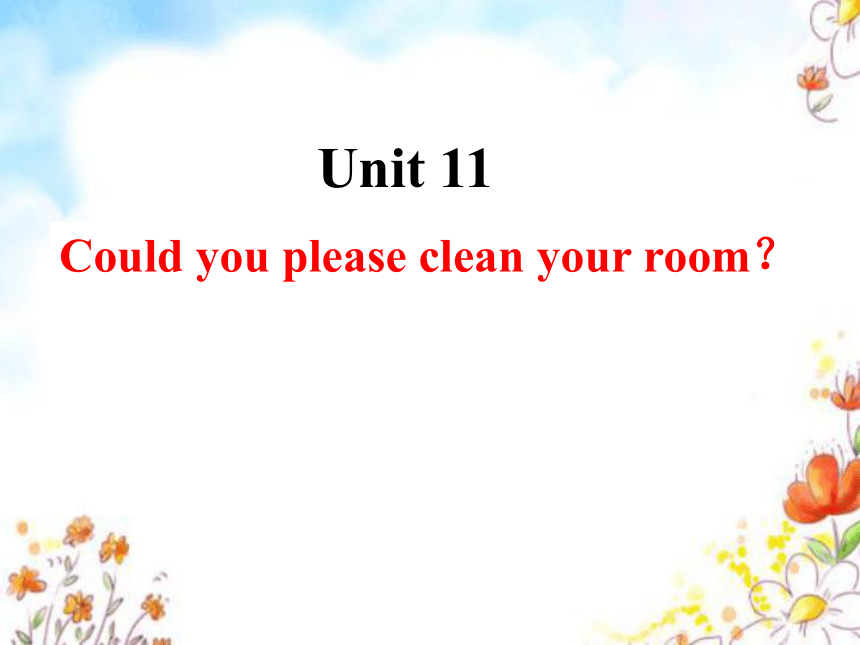
|
|
| 格式 | zip | ||
| 文件大小 | 1.3MB | ||
| 资源类型 | 教案 | ||
| 版本资源 | 人教新目标(Go for it)版 | ||
| 科目 | 英语 | ||
| 更新时间 | 2013-01-16 00:00:00 | ||
图片预览

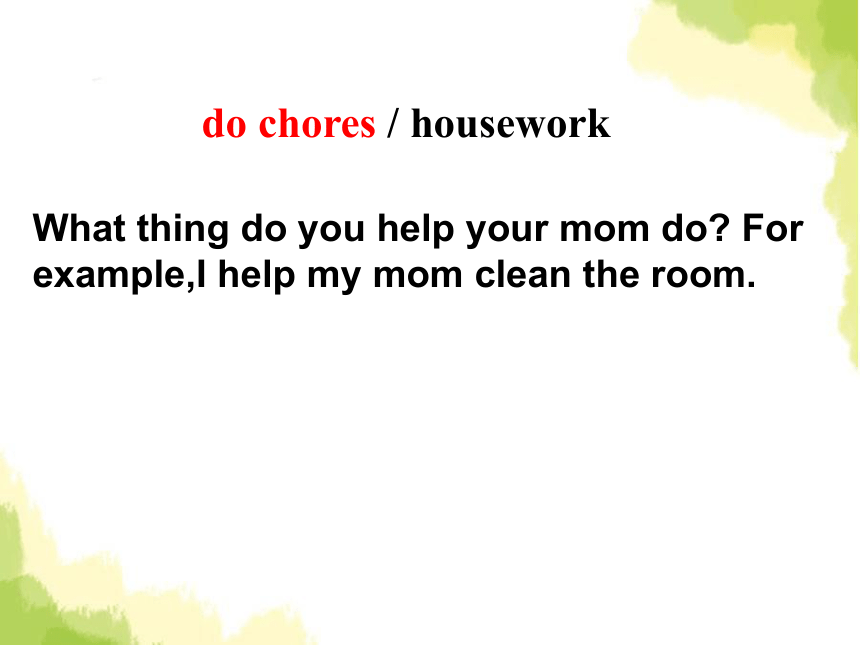
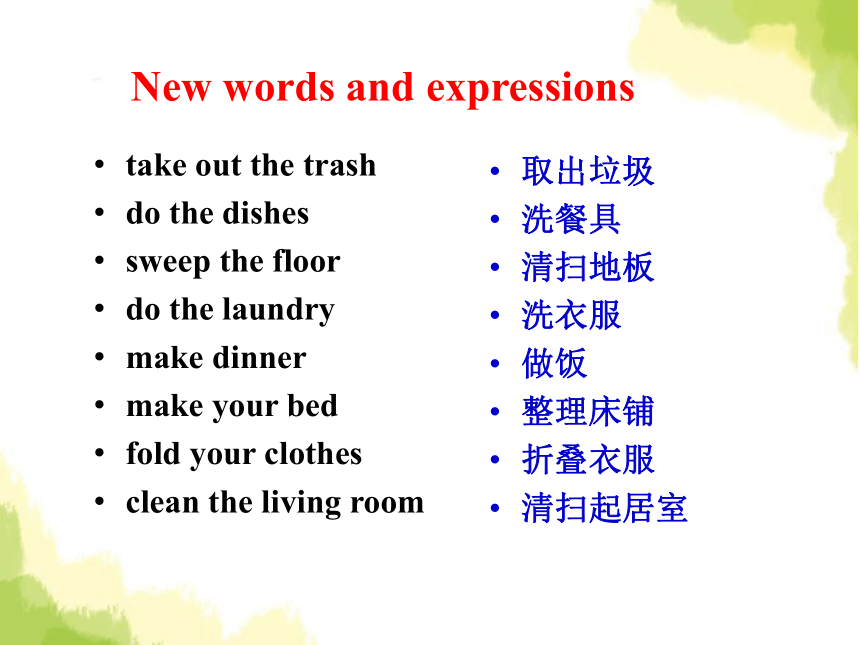
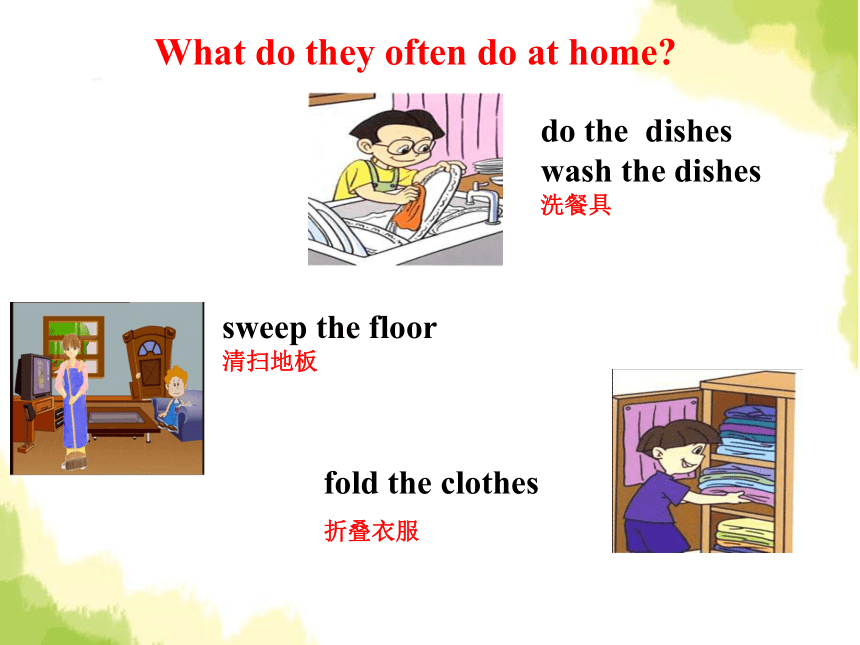
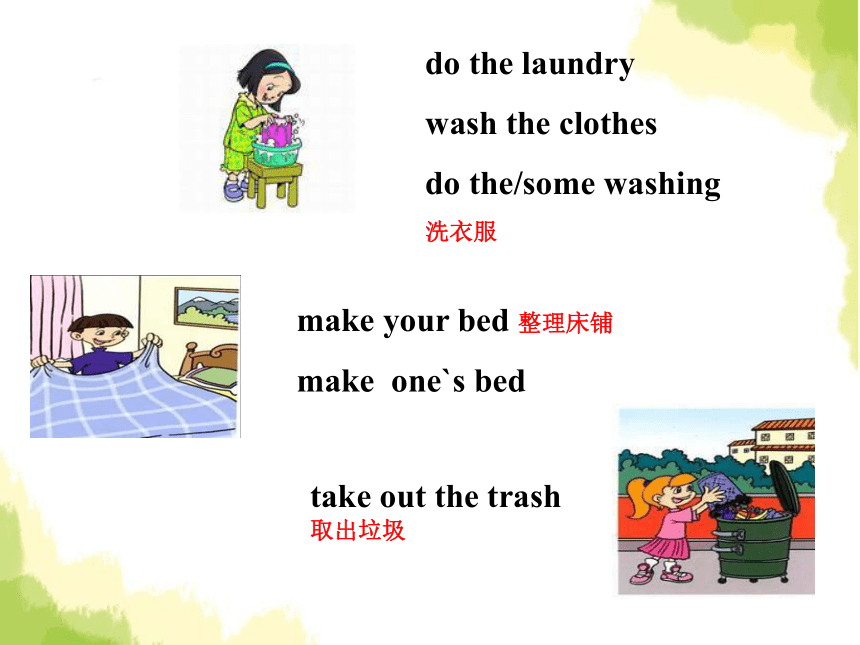
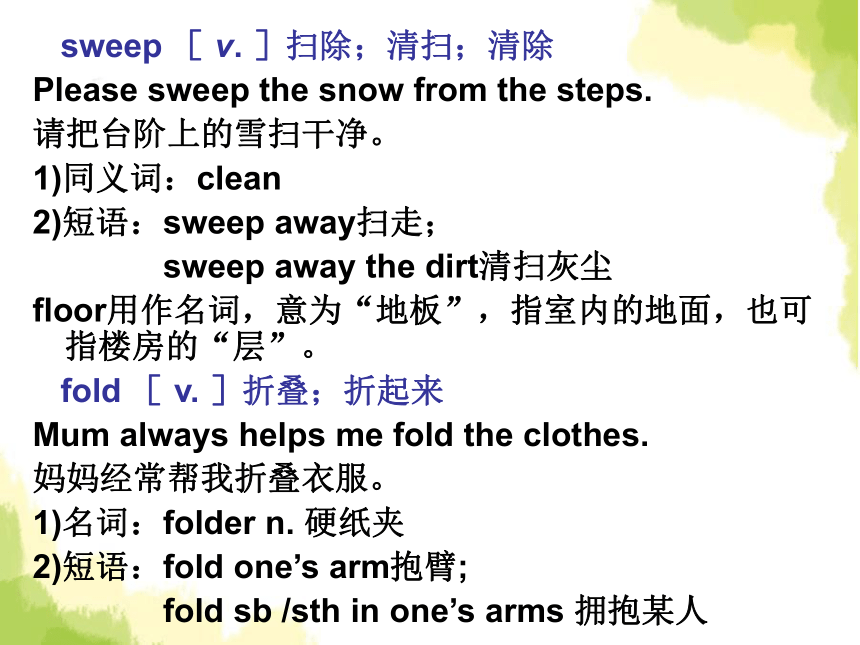
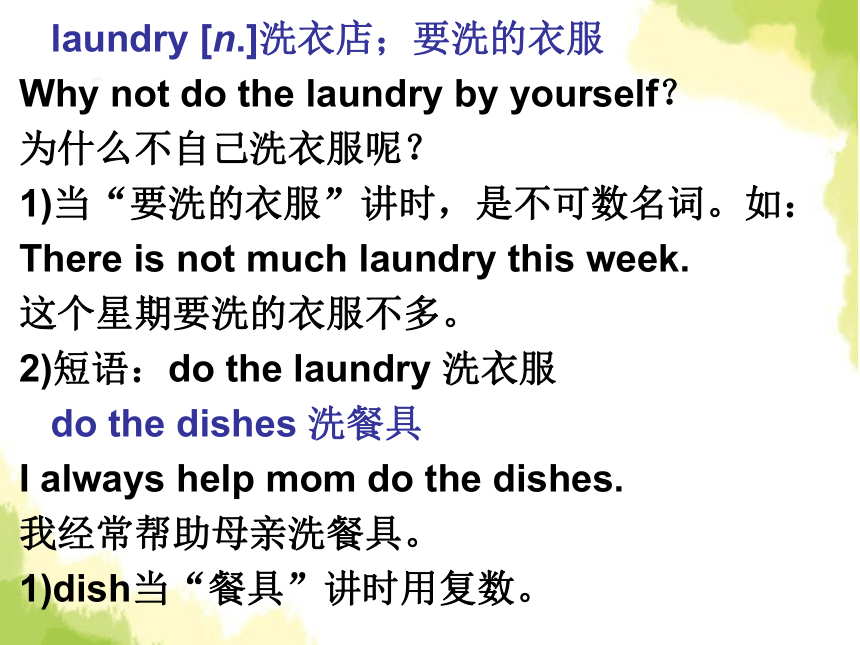
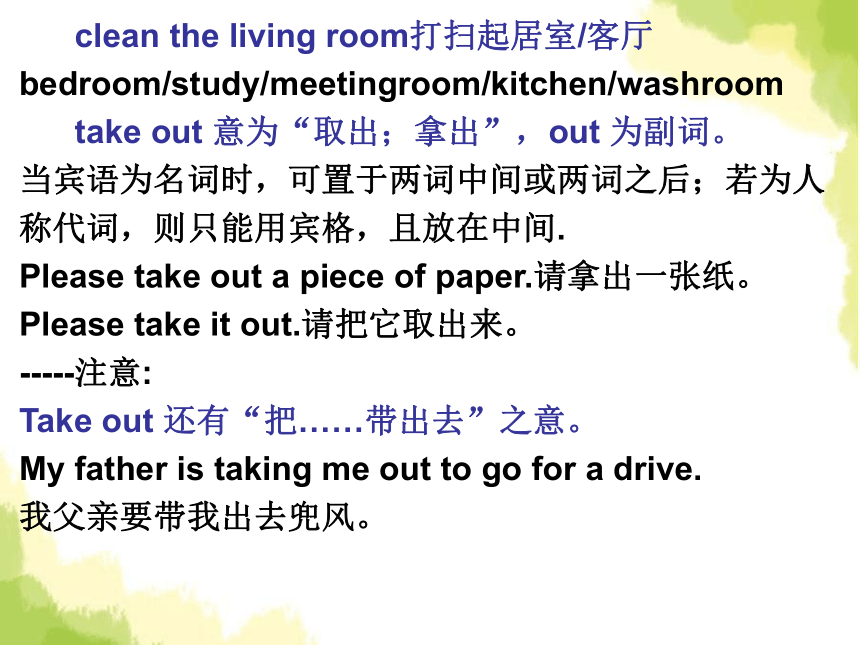
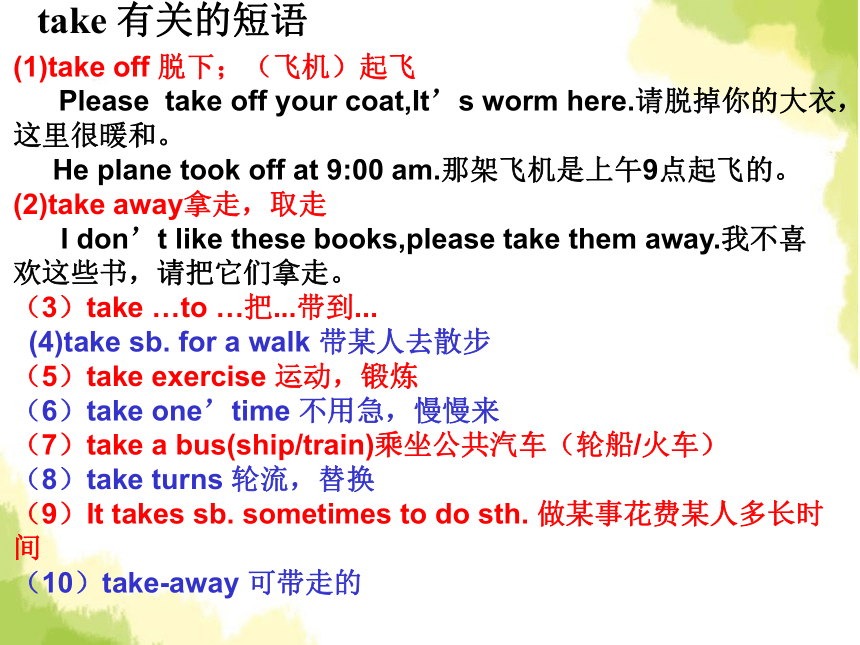
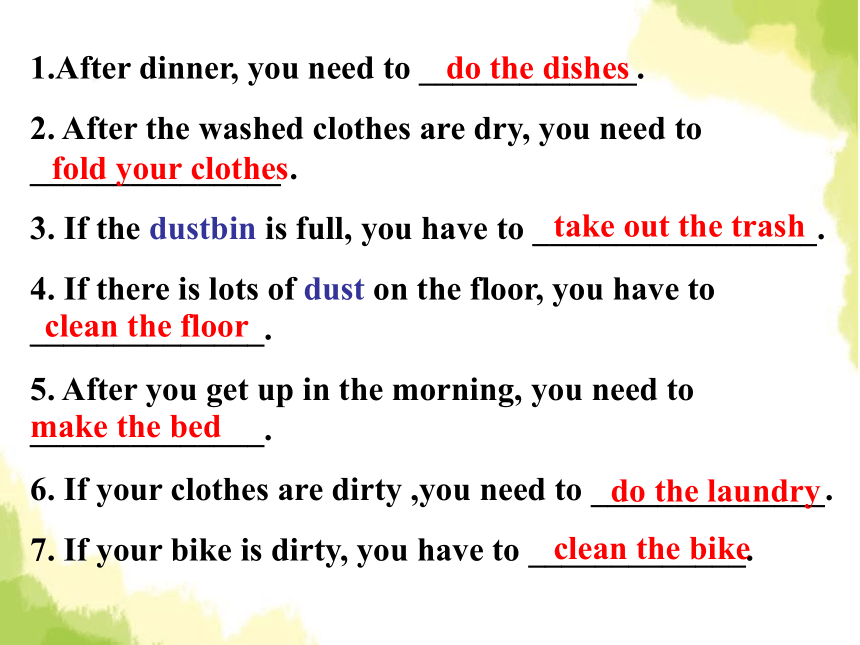
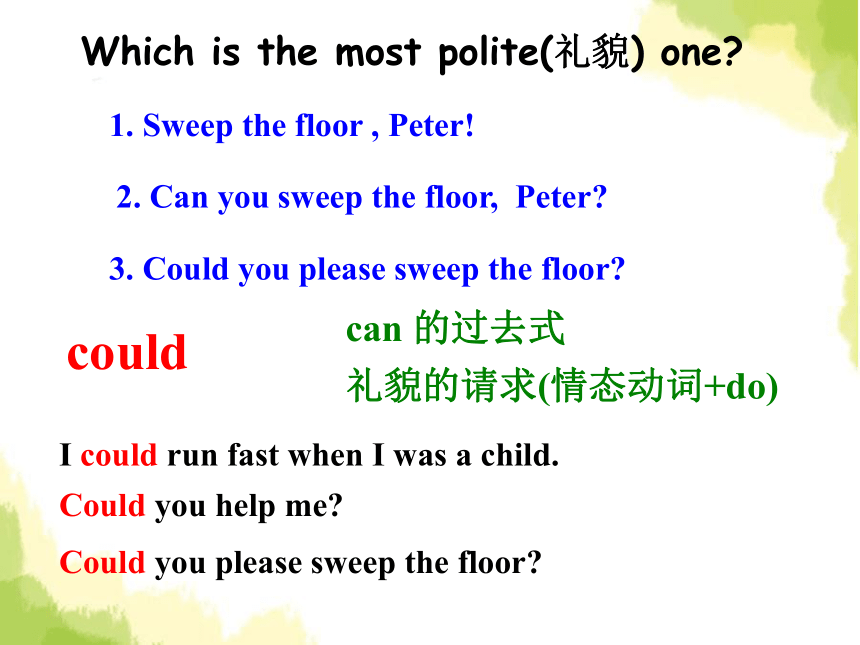
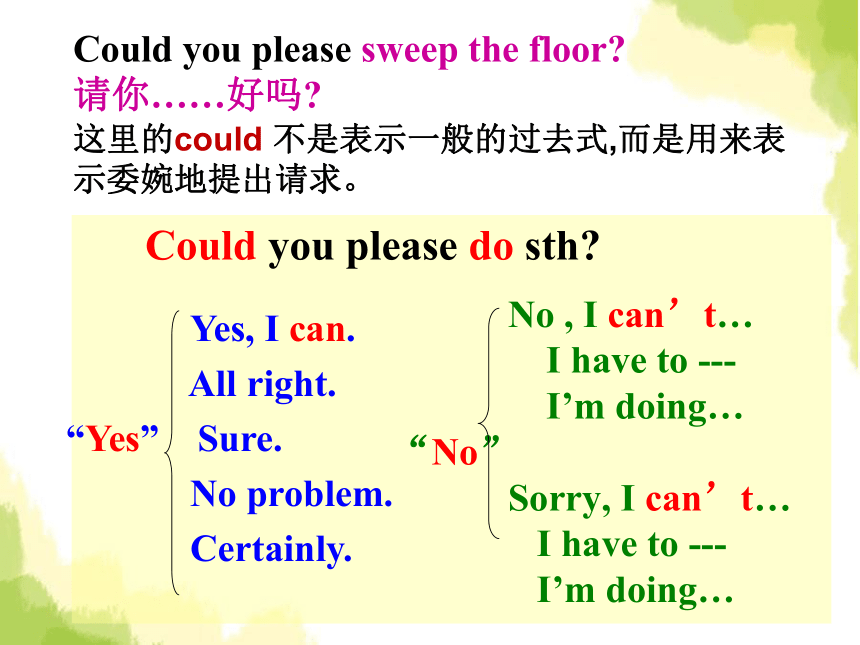
文档简介
课件40张PPT。Could you please clean your room?Unit 11 What thing do you help your mom do? For example,I help my mom clean the room.do chores / houseworkNew words and expressionstake out the trash
do the dishes
sweep the floor
do the laundry
make dinner
make your bed
fold your clothes
clean the living room 取出垃圾
洗餐具
清扫地板
洗衣服
做饭
整理床铺
折叠衣服
清扫起居室
sweep the floor
清扫地板
do the dishes
wash the dishes洗餐具fold the clothes
折叠衣服What do they often do at home?make your bed 整理床铺
make one`s bedtake out the trash 取出垃圾 do the laundry
wash the clothes
do the/some washing
洗衣服 sweep [ v. ]扫除;清扫;清除
Please sweep the snow from the steps.
请把台阶上的雪扫干净。
1)同义词:clean
2)短语:sweep away扫走;
sweep away the dirt清扫灰尘
floor用作名词,意为“地板”,指室内的地面,也可指楼房的“层”。
fold [ v. ]折叠;折起来
Mum always helps me fold the clothes.
妈妈经常帮我折叠衣服。
1)名词:folder n. 硬纸夹
2)短语:fold one’s arm抱臂;
fold sb /sth in one’s arms 拥抱某人
laundry [n.]洗衣店;要洗的衣服
Why not do the laundry by yourself?
为什么不自己洗衣服呢?
1)当“要洗的衣服”讲时,是不可数名词。如:
There is not much laundry this week.
这个星期要洗的衣服不多。
2)短语:do the laundry 洗衣服
do the dishes 洗餐具
I always help mom do the dishes.
我经常帮助母亲洗餐具。
1)dish当“餐具”讲时用复数。
clean the living room打扫起居室/客厅 bedroom/study/meetingroom/kitchen/washroom
take out 意为“取出;拿出”,out 为副词。
当宾语为名词时,可置于两词中间或两词之后;若为人称代词,则只能用宾格,且放在中间.
Please take out a piece of paper.请拿出一张纸。
Please take it out.请把它取出来。
-----注意:
Take out 还有“把……带出去”之意。
My father is taking me out to go for a drive.
我父亲要带我出去兜风。
(1)take off 脱下;(飞机)起飞
Please take off your coat,It’s worm here.请脱掉你的大衣,这里很暖和。
He plane took off at 9:00 am.那架飞机是上午9点起飞的。
(2)take away拿走,取走
I don’t like these books,please take them away.我不喜欢这些书,请把它们拿走。
(3)take …to …把...带到...
(4)take sb. for a walk 带某人去散步
(5)take exercise 运动,锻炼
(6)take one’time 不用急,慢慢来
(7)take a bus(ship/train)乘坐公共汽车(轮船/火车)
(8)take turns 轮流,替换
(9)It takes sb. sometimes to do sth. 做某事花费某人多长时间
(10)take-away 可带走的take 有关的短语1.After dinner, you need to _____________.
2. After the washed clothes are dry, you need to _______________ .
3. If the dustbin is full, you have to _________________.
4. If there is lots of dust on the floor, you have to ______________.
5. After you get up in the morning, you need to ______________.
6. If your clothes are dirty ,you need to ______________.
7. If your bike is dirty, you have to _____________.do the dishesfold your clothestake out the trashclean the floormake the beddo the laundryclean the bike1. Sweep the floor , Peter!2. Can you sweep the floor, Peter?3. Could you please sweep the floor?Which is the most polite(礼貌) one?couldI could run fast when I was a child.Could you help me?can 的过去式礼貌的请求(情态动词+do)Could you please sweep the floor?Could you please sweep the floor?
请你……好吗?这里的could 不是表示一般的过去式,而是用来表示委婉地提出请求。 Could you please do sth?
Language points: 1. could表示请求,语气委婉,显得有礼貌。 Could you please clean your room ? 你可以打扫你的房间吗? 肯定回答:Yes , I can .是的,我可以。
Yes , sure / Yes , of course . 否定回答:Sorry , I can’t . I have to do my homework . 对不起,我不得不做作业。 另外Would you mind doing sth .也可表示请求。 Would you mind cleaning your room ? 你介意去打扫你的房间吗? No , I‘d like to .不,我很乐意。 1. 你能倒一下垃圾吗?
当然可以。
2. 你能洗下衣服吗?
不行啊,我得先完成作业。
Translation:Could you please take out the trash?
Yes, I can. /Yes, sure./ Of course./CertainlyCould you please do the laundry?
Sorry, I can’t. I have to do my homework first.1b Listen and check (√):what kind of chores do Mom and Peter do?√√√√√√1c PairworkA: Could you please sweep the floor?
B: Yes, sure. / I’m sorry, but I’m
reading the newspaper.take out the trash
do the dishes
sweep the floor
do the laundry
make dinner
make your bed
fold your clothes
clean the living room √√√√2a /2b work on… (从事于/忙于/致力于/演算/操作…)
work (hard) at…(在…方面努力地工作/学习)
work for 为...做事
work...out计算出
work as 以...身份工作2c:pair work1.继续工作 They'll work on till sunset.他们将继续工作, 直到日落。2.轻轻地安装好 He managed to work the screw on.他设法把螺丝装好了。3.影响; 激起 The medicine the doctor prescribed worked upon his illness.医生开的那种药对他的病有疗效。4.致力于… He has been working on a new novel for over a year now.近一年多来, 他一直在写一部新小说。5.努力影响〔说服〕 We will work on those who have erred and help them do right.我们将对犯了错误的人做工作, 并帮助他们改正。She'll work on him to make him change his mind.她将努力说服他改变主意。
3aA: I hate to___ chores.
B: Well, I hate some chores too, but I
like other chores.
A: Really? Do you like to___ the laundry?
B: No, I don’t. It’s boring.
A: I agree. Do you like to_____ your bed?
B: No, not really. But I like to___ the
dishes, because it’s relaxing. And I
like to______ breakfast, because I like
to cook.dodomakedomakeFill in the blanks with “make” or “do”. 1. hate [v.] 憎恨;憎恶 dislike / don’t like
I hate to trouble you.我不想麻烦你。
反义词为 like
hate sb./sth.讨厌某人/某事
hate doing与 hate to do:
hate doing强调习惯性、经常性的动作;
hate to do强调某一次的动作
例如:
I hate to get up early, for it’s Sunday tomorrow.
明天是星期日,我不想早起床。
I hate getting up early.
我厌烦早起床。(经常性的动作)
2. agree:say “yes”to sb./sth.
disagree:say “no” to sb./sth.
agree/disagree (v.)
agree with sb./ sth.(同意某人/某事)
I agree with you.
I agree with what you said(your words).
agree on sth.(对…意见一致,对…达成协议)
We agree on this count.
agree to sth.(同意,答应,赞成)
She agreed to my idea/plan/arrangement.
agree to do sth.(同意做某事)
My mother agreed to give me money. agreement /disagreement(n.) 3.区别动词do和makedo the dishes 洗碗
do my homework
做家庭作业
do chores 做家务活
do the laundry 洗衣
do some shopping 购物
do some reading 读书make your bed 铺床
make breakfast 做早餐
make dinner 做晚饭
make tea 泡茶
make myself a cup of coffee
给自己冲一包咖啡do 与动作及非实质性
的事连用,与词尾是
-ing 的动作名词连用。make 表示做,制造、整理、冲、泡
(饮料) 等。do chores
do the laundry
do the dishes
make the bed
make breakfast
clean the bike
clean the room
fold the clothes
take out the trash
sweep the floor
Do you like doing chores?Do you hate doing chores?Why?LikeHate 1. buy some drinks and snacks
2. borrow some money
3. clean your room
4. invite my friends to a party
5. go to the store
6. use your CD player
7. take out the trash
8. make your bed小吃,快餐借邀请teenagersteenagersteenagersteenagersparentsparentsparentsparents1a Parents or teenagers? 1. borrow与lend
(1)borrow指“借入”或“借用他人的东西供自己使用”。
“向某人借某物”可译成borrow sth. from sb.或borrow one's
sth.
May I borrow your bike?
=May I borrow a bike from you? 我可以借用你的自行车吗?
(2)lend表示把自己的东西“借出”给别人暂时使用。
“借给某人某物”可译成lend sb sth 或lend sth to sb。
You mustn't lend it to others.你一定不要把它借给别人。
(3)keep sth for+时间段"借某物多长时间"
2.invite v.邀请,其名词形式是invitation(邀请)。
(1)invite sb. to+地点 邀请某人到某地
invite Jenny to my house邀请珍妮到我家
(2)invite sb. to do sth. 邀请某人做某事
We invited them to dance.我们邀请他们跳舞。Could you please…?Could I…? clean your room
go to the store
take out the trash
make your bedborrow some money invite my friends to a party buy some drinks and snacksuse your CD player1b Role play
Use the phrases in 1a to make conversations.2a Listen and check( ) the things in activity 1a
that you hear.? 1. buy some drinks and snacks
2. borrow some money
3. clean your room
4. invite my friends to a party
5. go to the store
6. use your CD player
7. take out the trash
8. make your bed??????buy drinks and snacksclean her room use the CD playerborrow some moneymove the good chairs
clean the living room2b Listen again. What is Sandy’s mom going to do? What is Sandy going to do? What are Sandy and Dave going to do? Fill in the chart.You are having a party. Ask your partner for help.go to the store
buy drinks and snacks
do the dishes
cleaning the living room
take out the trashA: Could you take out the trash?
B: Yes, sure.2C Pairwork3a Language points
1. Thanks for taking care of …
2. Could you please do …?
3. Take him for a walk.
4. Give him water.
5. feed … with sth.
6. play with
7. forget to do sth.
8. See you next week!
1. thanks for意为因……而感谢,for是介词,后面跟名词或动名词。
Thanks for your help.感谢你的帮助。
Thanks for telling me that.谢谢告诉我那件事。2.take care of 意为“照看、照料” =look after
你应该照顾好自己。
You should take care of yourself. =You should look after yourself.
take good care of ...= look after ... well 意为“好好照料”
You should take good care of your eyes.
He takes good care of the trees.
take care意为“当心”。例如:
小心!车来了!
Take care!The car is coming!
take care (not) to do sth.小心(别)做某事
Take care to drive.
Take care not to drive too fast.3.feed 为…喂食 (fed)
feed sb./sth.
她喂她的女儿。 She feeds her daughter.
汤姆昨天喂了猫。 Tom fed the cat yesterday.
feed sb with/on sth =feed sth to sb
她用牛奶喂她的女儿。
She feeds her daughter with/on milk.
汤姆昨天用鱼喂猫。
Tom fed the cat with/on fish.
= Tom fed fish to the cat
feed on 不及物,以…为食
马吃草。
Horses feed on grass.
区别 live on 以...为生
He lives on teaching.他以教书为生。4.play with玩耍/弄
玩火是危险的。
It’s dangerous to play with fire.
别在街上玩篮球。
Don’t play with the basketball in the street.
5.forget to do sth.忘记去做某事(反义词remember)
我总是忘了关窗。
I always forget to close the windows.
forget doing sth.忘记做过某事
我忘了刚才已经关窗了。
I forgot closing the windows just now.6.英语中常用祈使句来表示祝福。
Have a good time!祝你玩得高兴!
Have a good trip!祝你旅途愉快!
Have a nice weekend!周末愉快!Complete the chart.Take him for a walk.
Play with him. Wash his bowl.
Clean his bed.Give him water and feed him.3b Sandy wants Dave to help her with her party. Complete this e-mail message from Sandy to Dave. Look at the chart in activity 2b for ideas. Dave,
Mom says I can have the school party at my house. I need some help. When you come over on Saturday, could you help me sweep the floor?
Thanks,
Sandy Could you clean the living room with me? And I need to move the chairs to the bedroom, could you help me move the chairs to the bedroom?Self checkhate take care of work on use forget1. I doing the dishes. It’s too boring.
2. I’m going to my English project
and then meet my friends.
3. My mom gets really angry when I to
clean my room.
4. Can I your dictionary, please? Mine is
at home.
5. Could you my cat when I’m
on vacation?hatework onforgetusetake care of 1.mine=my dictionary 名词性物主代词=形容词性物主代词+名词,意为“我的”。
物主代词有名词性物主代词和形容词性物主代词之分。
名词性物主代词用法相当于名词,通常用来作主语、宾语和表语,其后不再跟名词;形容词性物主代词用来作定语,其后需跟一个名词。
This classroom isn't ours.It's theirs.Ours is over there.这个教室不是我们的,是他们的。我们的在那里.
2.be in=be at home在家
be out 不在家
I called Jenny.but she wasn't in.
I called Jenny. but she was out.
I called Jenny.but she wasn't at home.我给珍妮打电话,可她不在家。
形容词性物主代词 名词性物主代词
第一人称单数 my mine 我的
第二人称单数 your yours 你的
第三人称单数 his,her,its his,hers,its
他的,她的,它的
第一人称复数 our ours 我们的
第二人称复数 your yours 你们的
第三人称复数 their theirs
他们的、她们的、它们的
do the dishes
sweep the floor
do the laundry
make dinner
make your bed
fold your clothes
clean the living room 取出垃圾
洗餐具
清扫地板
洗衣服
做饭
整理床铺
折叠衣服
清扫起居室
sweep the floor
清扫地板
do the dishes
wash the dishes洗餐具fold the clothes
折叠衣服What do they often do at home?make your bed 整理床铺
make one`s bedtake out the trash 取出垃圾 do the laundry
wash the clothes
do the/some washing
洗衣服 sweep [ v. ]扫除;清扫;清除
Please sweep the snow from the steps.
请把台阶上的雪扫干净。
1)同义词:clean
2)短语:sweep away扫走;
sweep away the dirt清扫灰尘
floor用作名词,意为“地板”,指室内的地面,也可指楼房的“层”。
fold [ v. ]折叠;折起来
Mum always helps me fold the clothes.
妈妈经常帮我折叠衣服。
1)名词:folder n. 硬纸夹
2)短语:fold one’s arm抱臂;
fold sb /sth in one’s arms 拥抱某人
laundry [n.]洗衣店;要洗的衣服
Why not do the laundry by yourself?
为什么不自己洗衣服呢?
1)当“要洗的衣服”讲时,是不可数名词。如:
There is not much laundry this week.
这个星期要洗的衣服不多。
2)短语:do the laundry 洗衣服
do the dishes 洗餐具
I always help mom do the dishes.
我经常帮助母亲洗餐具。
1)dish当“餐具”讲时用复数。
clean the living room打扫起居室/客厅 bedroom/study/meetingroom/kitchen/washroom
take out 意为“取出;拿出”,out 为副词。
当宾语为名词时,可置于两词中间或两词之后;若为人称代词,则只能用宾格,且放在中间.
Please take out a piece of paper.请拿出一张纸。
Please take it out.请把它取出来。
-----注意:
Take out 还有“把……带出去”之意。
My father is taking me out to go for a drive.
我父亲要带我出去兜风。
(1)take off 脱下;(飞机)起飞
Please take off your coat,It’s worm here.请脱掉你的大衣,这里很暖和。
He plane took off at 9:00 am.那架飞机是上午9点起飞的。
(2)take away拿走,取走
I don’t like these books,please take them away.我不喜欢这些书,请把它们拿走。
(3)take …to …把...带到...
(4)take sb. for a walk 带某人去散步
(5)take exercise 运动,锻炼
(6)take one’time 不用急,慢慢来
(7)take a bus(ship/train)乘坐公共汽车(轮船/火车)
(8)take turns 轮流,替换
(9)It takes sb. sometimes to do sth. 做某事花费某人多长时间
(10)take-away 可带走的take 有关的短语1.After dinner, you need to _____________.
2. After the washed clothes are dry, you need to _______________ .
3. If the dustbin is full, you have to _________________.
4. If there is lots of dust on the floor, you have to ______________.
5. After you get up in the morning, you need to ______________.
6. If your clothes are dirty ,you need to ______________.
7. If your bike is dirty, you have to _____________.do the dishesfold your clothestake out the trashclean the floormake the beddo the laundryclean the bike1. Sweep the floor , Peter!2. Can you sweep the floor, Peter?3. Could you please sweep the floor?Which is the most polite(礼貌) one?couldI could run fast when I was a child.Could you help me?can 的过去式礼貌的请求(情态动词+do)Could you please sweep the floor?Could you please sweep the floor?
请你……好吗?这里的could 不是表示一般的过去式,而是用来表示委婉地提出请求。 Could you please do sth?
Language points: 1. could表示请求,语气委婉,显得有礼貌。 Could you please clean your room ? 你可以打扫你的房间吗? 肯定回答:Yes , I can .是的,我可以。
Yes , sure / Yes , of course . 否定回答:Sorry , I can’t . I have to do my homework . 对不起,我不得不做作业。 另外Would you mind doing sth .也可表示请求。 Would you mind cleaning your room ? 你介意去打扫你的房间吗? No , I‘d like to .不,我很乐意。 1. 你能倒一下垃圾吗?
当然可以。
2. 你能洗下衣服吗?
不行啊,我得先完成作业。
Translation:Could you please take out the trash?
Yes, I can. /Yes, sure./ Of course./CertainlyCould you please do the laundry?
Sorry, I can’t. I have to do my homework first.1b Listen and check (√):what kind of chores do Mom and Peter do?√√√√√√1c PairworkA: Could you please sweep the floor?
B: Yes, sure. / I’m sorry, but I’m
reading the newspaper.take out the trash
do the dishes
sweep the floor
do the laundry
make dinner
make your bed
fold your clothes
clean the living room √√√√2a /2b work on… (从事于/忙于/致力于/演算/操作…)
work (hard) at…(在…方面努力地工作/学习)
work for 为...做事
work...out计算出
work as 以...身份工作2c:pair work1.继续工作 They'll work on till sunset.他们将继续工作, 直到日落。2.轻轻地安装好 He managed to work the screw on.他设法把螺丝装好了。3.影响; 激起 The medicine the doctor prescribed worked upon his illness.医生开的那种药对他的病有疗效。4.致力于… He has been working on a new novel for over a year now.近一年多来, 他一直在写一部新小说。5.努力影响〔说服〕 We will work on those who have erred and help them do right.我们将对犯了错误的人做工作, 并帮助他们改正。She'll work on him to make him change his mind.她将努力说服他改变主意。
3aA: I hate to___ chores.
B: Well, I hate some chores too, but I
like other chores.
A: Really? Do you like to___ the laundry?
B: No, I don’t. It’s boring.
A: I agree. Do you like to_____ your bed?
B: No, not really. But I like to___ the
dishes, because it’s relaxing. And I
like to______ breakfast, because I like
to cook.dodomakedomakeFill in the blanks with “make” or “do”. 1. hate [v.] 憎恨;憎恶 dislike / don’t like
I hate to trouble you.我不想麻烦你。
反义词为 like
hate sb./sth.讨厌某人/某事
hate doing与 hate to do:
hate doing强调习惯性、经常性的动作;
hate to do强调某一次的动作
例如:
I hate to get up early, for it’s Sunday tomorrow.
明天是星期日,我不想早起床。
I hate getting up early.
我厌烦早起床。(经常性的动作)
2. agree:say “yes”to sb./sth.
disagree:say “no” to sb./sth.
agree/disagree (v.)
agree with sb./ sth.(同意某人/某事)
I agree with you.
I agree with what you said(your words).
agree on sth.(对…意见一致,对…达成协议)
We agree on this count.
agree to sth.(同意,答应,赞成)
She agreed to my idea/plan/arrangement.
agree to do sth.(同意做某事)
My mother agreed to give me money. agreement /disagreement(n.) 3.区别动词do和makedo the dishes 洗碗
do my homework
做家庭作业
do chores 做家务活
do the laundry 洗衣
do some shopping 购物
do some reading 读书make your bed 铺床
make breakfast 做早餐
make dinner 做晚饭
make tea 泡茶
make myself a cup of coffee
给自己冲一包咖啡do 与动作及非实质性
的事连用,与词尾是
-ing 的动作名词连用。make 表示做,制造、整理、冲、泡
(饮料) 等。do chores
do the laundry
do the dishes
make the bed
make breakfast
clean the bike
clean the room
fold the clothes
take out the trash
sweep the floor
Do you like doing chores?Do you hate doing chores?Why?LikeHate 1. buy some drinks and snacks
2. borrow some money
3. clean your room
4. invite my friends to a party
5. go to the store
6. use your CD player
7. take out the trash
8. make your bed小吃,快餐借邀请teenagersteenagersteenagersteenagersparentsparentsparentsparents1a Parents or teenagers? 1. borrow与lend
(1)borrow指“借入”或“借用他人的东西供自己使用”。
“向某人借某物”可译成borrow sth. from sb.或borrow one's
sth.
May I borrow your bike?
=May I borrow a bike from you? 我可以借用你的自行车吗?
(2)lend表示把自己的东西“借出”给别人暂时使用。
“借给某人某物”可译成lend sb sth 或lend sth to sb。
You mustn't lend it to others.你一定不要把它借给别人。
(3)keep sth for+时间段"借某物多长时间"
2.invite v.邀请,其名词形式是invitation(邀请)。
(1)invite sb. to+地点 邀请某人到某地
invite Jenny to my house邀请珍妮到我家
(2)invite sb. to do sth. 邀请某人做某事
We invited them to dance.我们邀请他们跳舞。Could you please…?Could I…? clean your room
go to the store
take out the trash
make your bedborrow some money invite my friends to a party buy some drinks and snacksuse your CD player1b Role play
Use the phrases in 1a to make conversations.2a Listen and check( ) the things in activity 1a
that you hear.? 1. buy some drinks and snacks
2. borrow some money
3. clean your room
4. invite my friends to a party
5. go to the store
6. use your CD player
7. take out the trash
8. make your bed??????buy drinks and snacksclean her room use the CD playerborrow some moneymove the good chairs
clean the living room2b Listen again. What is Sandy’s mom going to do? What is Sandy going to do? What are Sandy and Dave going to do? Fill in the chart.You are having a party. Ask your partner for help.go to the store
buy drinks and snacks
do the dishes
cleaning the living room
take out the trashA: Could you take out the trash?
B: Yes, sure.2C Pairwork3a Language points
1. Thanks for taking care of …
2. Could you please do …?
3. Take him for a walk.
4. Give him water.
5. feed … with sth.
6. play with
7. forget to do sth.
8. See you next week!
1. thanks for意为因……而感谢,for是介词,后面跟名词或动名词。
Thanks for your help.感谢你的帮助。
Thanks for telling me that.谢谢告诉我那件事。2.take care of 意为“照看、照料” =look after
你应该照顾好自己。
You should take care of yourself. =You should look after yourself.
take good care of ...= look after ... well 意为“好好照料”
You should take good care of your eyes.
He takes good care of the trees.
take care意为“当心”。例如:
小心!车来了!
Take care!The car is coming!
take care (not) to do sth.小心(别)做某事
Take care to drive.
Take care not to drive too fast.3.feed 为…喂食 (fed)
feed sb./sth.
她喂她的女儿。 She feeds her daughter.
汤姆昨天喂了猫。 Tom fed the cat yesterday.
feed sb with/on sth =feed sth to sb
她用牛奶喂她的女儿。
She feeds her daughter with/on milk.
汤姆昨天用鱼喂猫。
Tom fed the cat with/on fish.
= Tom fed fish to the cat
feed on 不及物,以…为食
马吃草。
Horses feed on grass.
区别 live on 以...为生
He lives on teaching.他以教书为生。4.play with玩耍/弄
玩火是危险的。
It’s dangerous to play with fire.
别在街上玩篮球。
Don’t play with the basketball in the street.
5.forget to do sth.忘记去做某事(反义词remember)
我总是忘了关窗。
I always forget to close the windows.
forget doing sth.忘记做过某事
我忘了刚才已经关窗了。
I forgot closing the windows just now.6.英语中常用祈使句来表示祝福。
Have a good time!祝你玩得高兴!
Have a good trip!祝你旅途愉快!
Have a nice weekend!周末愉快!Complete the chart.Take him for a walk.
Play with him. Wash his bowl.
Clean his bed.Give him water and feed him.3b Sandy wants Dave to help her with her party. Complete this e-mail message from Sandy to Dave. Look at the chart in activity 2b for ideas. Dave,
Mom says I can have the school party at my house. I need some help. When you come over on Saturday, could you help me sweep the floor?
Thanks,
Sandy Could you clean the living room with me? And I need to move the chairs to the bedroom, could you help me move the chairs to the bedroom?Self checkhate take care of work on use forget1. I doing the dishes. It’s too boring.
2. I’m going to my English project
and then meet my friends.
3. My mom gets really angry when I to
clean my room.
4. Can I your dictionary, please? Mine is
at home.
5. Could you my cat when I’m
on vacation?hatework onforgetusetake care of 1.mine=my dictionary 名词性物主代词=形容词性物主代词+名词,意为“我的”。
物主代词有名词性物主代词和形容词性物主代词之分。
名词性物主代词用法相当于名词,通常用来作主语、宾语和表语,其后不再跟名词;形容词性物主代词用来作定语,其后需跟一个名词。
This classroom isn't ours.It's theirs.Ours is over there.这个教室不是我们的,是他们的。我们的在那里.
2.be in=be at home在家
be out 不在家
I called Jenny.but she wasn't in.
I called Jenny. but she was out.
I called Jenny.but she wasn't at home.我给珍妮打电话,可她不在家。
形容词性物主代词 名词性物主代词
第一人称单数 my mine 我的
第二人称单数 your yours 你的
第三人称单数 his,her,its his,hers,its
他的,她的,它的
第一人称复数 our ours 我们的
第二人称复数 your yours 你们的
第三人称复数 their theirs
他们的、她们的、它们的
同课章节目录
- Unit 1 What's the matter?
- Section A
- Section B
- Unit 2 I'll help to clean up the city parks.
- Section A
- Section B
- Unit 3 Could you please clean your room?
- Section A
- Section B
- Unit 4 Why don't you talk to your parents?
- Section A
- Section B
- Unit 5 What were you doing when the rainstorm came
- Section A
- Section B
- Review of Units 1-5
- Unit 6 An old man tried to move the mountains.
- Section A
- Section B
- Unit 7 What's the highest mountain in the world?
- Section A
- Section B
- Unit 8 Have you read Treasure Island yet?
- Section A
- Section B
- Unit 9 Have you ever been to a museum?
- Section A
- Section B
- Unit 10 I've had this bike for three years.
- Section A
- Section B
